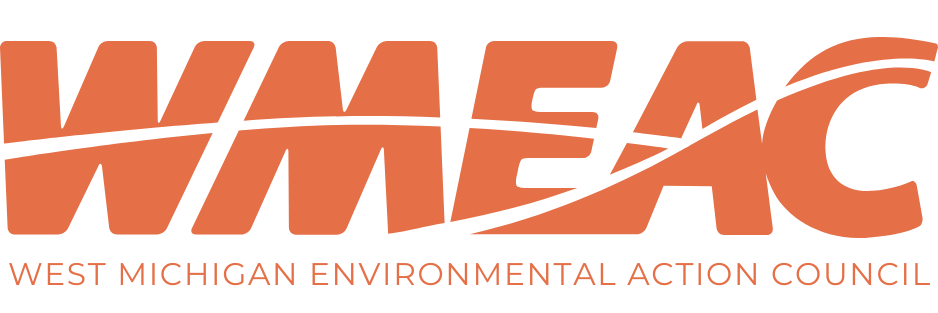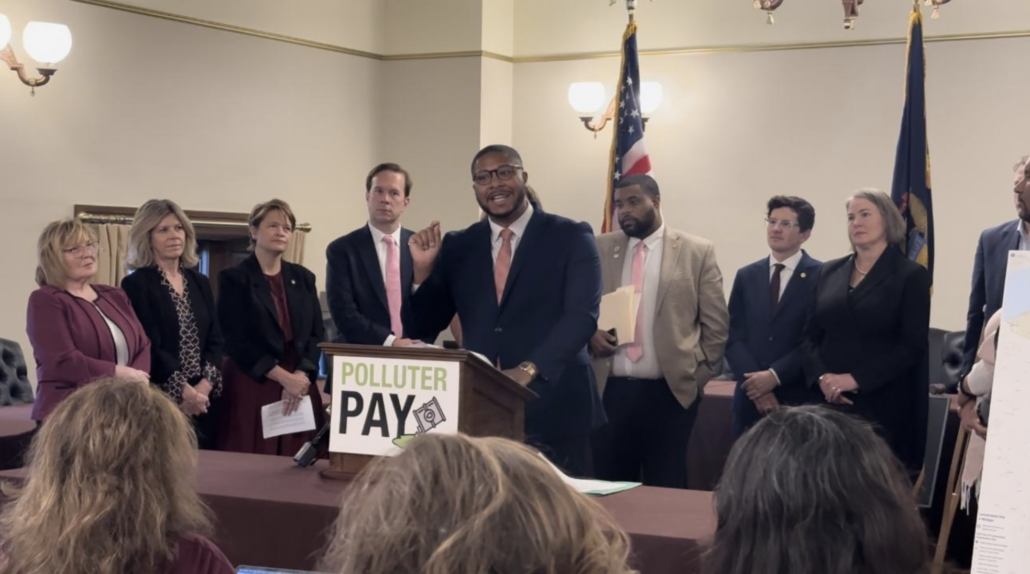By: Marshall A. Kilgore, Director of Engagement
Michigan holds a promising future when it comes to environmental policy. It has been a privilege for me to collaborate with dedicated environmental champions, legislators, and our community, all united in our commitment to forge bold, eco-friendly, and indispensable environmental measures. Let’s delve into the monumental legislation that marked 2023 and catch a glimpse of the prospective initiatives awaiting us in the upcoming year of 2024.
WMEAC is thrilled about the successful passage of the MI Clean Energy Package last year. This comprehensive package includes several key bills that will have a significant impact on Michigan’s energy landscape:
- Senate Bill 271: Senator Erika Geiss Investing in Clean Energy
This bill mandates that 50% of Michigan’s energy must come from renewable sources by 2030, with a further increase to 60% by 2035. This represents a four-fold increase in renewable energy generation within a decade. Additionally, the bill raises the cap on rooftop solar installations from 1% to 10%, promoting the adoption of clean and sustainable energy solutions. It also sets a target of 2,500 MW of energy storage capacity by 2030, which will enhance grid stability and reliability.
- Senate Bill 273: State Senator Sam Singh Boosting Energy Efficiency
This bill focuses on improving energy efficiency and reducing energy costs. It requires utility companies to increase their investments in energy efficiency measures, raising Michigan’s energy efficiency standards from 1% to 1.5%. Moreover, a minimum of 25% of energy efficiency spending must be allocated to benefit low-income communities. The bill also promotes job creation by mandating utilities to recruit, hire, and train individuals from low-income communities to perform weatherization and energy efficiency work.
- Senate Bill 502: Senator Sue Shink Strengthening the Public Service Commission
This bill expands the authority of the Michigan Public Service Commission to consider the needs of low-income individuals, environmental justice communities, and public health when approving utility companies’ long-term energy plans. It also grants the Commission the ability to evaluate utility plans based on affordability. Furthermore, the bill enhances customer input at the Commission, empowering ratepayers to have a stronger voice in energy-related decisions.
- Senate Bill 519: Senator Sam Singh Supporting Workers
This bill establishes the Office of Worker and Community Economic Transition, which will provide assistance to workers and communities during Michigan’s transition to clean energy. It recognizes the importance of supporting individuals and communities impacted by the changes in the energy sector, ensuring a smoother and more equitable transition.
Additionally, there are four House Bills, numbered 5120, 5121, 5122, and 5123, that will address and expand utility-scale siting for solar and wind energy projects. These bills aim to further promote the development and utilization of renewable energy sources.
Looking ahead, WMEAC eagerly anticipates the passing of more significant environmentally focused policies, such as the Polluter Pay package. This package specifically focuses on environmental justice, advocating for the rights and protection of marginalized communities from mistreatment by polluters.
The Polluter Pay package consists of seven bills that will be referred to the Senate Committee on Energy and Environment, chaired by Sen. McCann, and the House Committee on Natural Resources, Environment, Tourism and Outdoor Recreation, chaired by Rep. Laurie Pohutsky. Each bill in this package addresses a specific aspect of holding polluters accountable and ensuring environmental restoration:
- SB 605 (Irwin) and HB 5247 (Koleszar) aim to provide the Michigan Department of Environment, Great Lakes, and Energy (EGLE) and the public with more information regarding cleanups and polluted sites.
- SB 606 (Moss) and HB 5242 (Morgan) require polluters to bear the financial responsibility for restoring polluted land and water to a usable condition, minimizing the reliance on access restrictions as a substitute for proper cleanup.
- SB 607 (Chang) and HB 5245 (Arbit) empower EGLE to establish cleanup criteria without being easily blocked by Administrative Procedures Act (APA) rulemaking.
- SB 608 (Geiss) and HB 5246 (Tsernoglou) mandate that businesses handling significant quantities of potentially polluting materials must provide upfront financial assurance to cover any necessary cleanup expenses.
- SB 609 (McCann) and HB 5243 (Neeley) grant the state the authority to bring claims on behalf of the public, seeking coverage for cleanup costs and damages to natural resources caused by contaminants like PFAS that were not initially recognized as harmful within the previous limitation period.
- SB 610 (Shink) and HB 5241 (McKinney) enable individuals exposed to hazardous substances to bring claims against polluters to cover the costs of medical monitoring required to detect conditions linked to the exposure.
- SB 611 (McMorrow) and HB 5244 (Skaggs) establish a more equitable timeframe for individuals harmed by pollution to seek justice through the courts, starting the limitation period when the person discovers the claim.
WMEAC eagerly awaits the positive impact that these bills will have on Michigan’s environment, public health, and environmental justice efforts.


